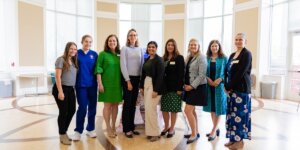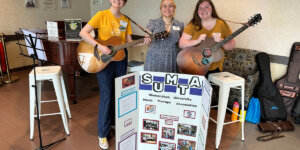Creating a literate citizenry through excellent education for current and future teachers, as well as through direct community outreach to children and families, is at the heart of a $50,000 grant awarded to Shenandoah University by the Claude Moore Charitable Foundation (CMCF). With this grant, Shenandoah University has received more than $300,000 in funding from CMCF since 2008.
The newly awarded grant will allow Shenandoah’s Claude Moore Center for Literacy (CMCL) to continue providing reading clinics, mentoring projects, expanded writing programs for disadvantaged students, and evidence-based professional development for local teachers at the pre-K through 12th grade levels.
“Research shows that quality of instruction is the most important factor in predicting a child’s achievement – more powerful than educational level, marital status, or economic status of a student’s parents,” said Karen Huff, Ed.D., co-director of the CMCL. Huff also serves as director of the Children’s Literature Program and professor of curriculum and instruction at Shenandoah.
“This is why it is vital for us to provide professional development opportunities for teachers who serve classrooms where our help can make the most difference – such as schools with limited professional development funds and those serving high numbers of children from disadvantaged backgrounds,” added Dr. Huff.
The CMCL emphasizes serving Virginia students with learning difficulties, students from economically and educationally disadvantaged backgrounds, and teachers and students from high-need or low-resource schools. Mary Bowser, Ed.D., director of Shenandoah University’s teacher licensure program and professor of curriculum and instruction, also serves as CMCL co-director.
The new funding will allow for the continuation of three main CMCL initiatives that have been effective for teachers throughout the Shenandoah Valley:
- A second offering of Early Childhood Development, a skills-based course provided free of charge to two pre-schools serving disadvantaged families as well as one Head Start program.
- An increased focus on helping teachers gain and practice their skills in teaching of writing in collaboration with the recently established Shenandoah Valley Writing Project (SVWP) and an expansion of the Young Writers’ Institute, which occurs concurrently with the Shenandoah University Children’s Literature Conference.
- An increase in scholarship support for Shenandoah Valley teachers taking graduate literacy courses in 2015, in order to accommodate a growing interest and respond to tightening professional development budgets in local schools.
Shenandoah County Public Schools has expressed a growing interest in enrolling teachers in the Foundations in Reading graduate course and sending teachers to the Children’s Literature Conference, which celebrates 30 years this summer. Both initiatives are supported in part by CMCF funding.
Allie Luden, a first grade teacher with Shenandoah County Public Schools, attended the Children’s Literature Conference in 2005 and returned again in 2014. “Hearing the authors speak about their books, their lives, and experiences drew my attention closer to the books, and created a personal connection that could be passed on to my students,” said Luden.
“I was so impressed with the caliber of authors that presented, and the workshops were beneficial with many relevant choices for reading and writing. I definitely plan to come back again,” she added.
“One of the most important things that I learned from the Foundations in Reading course was to immerse my students with purposeful literature,” said Alice Bauserman, also a first grade teacher with Shenandoah County Public Schools.
“Using picture books to teach, reinforce, extend, and motivate students seemed so simple, but yet, when put into action was amazingly powerful for all my students no matter what their reading level was,” added Bauserman.
Both teachers now recognize the importance of effectively using various types of literature in the classroom. “It is not ‘just grabbing a book off the shelf,’ but instead, using the book with a clear intent,” said Luden.
“To observe our students ‘come alive’ when being engaged with these various types of purposefully selected literature components was very eye-opening and motivating as teachers,” said Bauserman. “We became just as excited as our students to explore the power of books.”
Through the new CMCF funding, the second offering of the Early Childhood Development course will build upon the foundation created by the fall 2014 cohort, made up of teachers from Winchester Day Preschool, Fremont Street Nursery and Apple Country Head Start.
“What we’re trying to do is increase the knowledge base of those working with children – especially those who are working with the neediest populations,” said Huff. “For some of the teachers, this is their first true college-level class that they’ve taken.”
The goal is to enrich the preschool environment with words that the children may not be hearing at home. “It’s not the alphabet per se – it’s all the literacy-related events that led to a child knowing their alphabet,” said Huff. “It’s reading to them, talking to them, having conversations about books, doing nursery rhymes with children so they begin to play with language, and hearing sounds that bring about phonological awareness.”
The feedback from those involved in the course has been positive and encouraging.
“Our teachers have learned so much from this course, and they are eager and excited to come back and utilize what they have learned in the classroom,” said Lisa Geisler, director of Winchester Day Preschool, one of the preschools served by the Early Childhood Development class.
Thea Thomas, executive director of Apple Country Head Start, echoed those sentiments, saying that teachers have enjoyed the course because it makes learning fun. “The staff try to incorporate the books used in the class into their lesson plans, and it has increased their phonological awareness,” said Thomas.
“They have been expanding their reading areas, as well as spending more time of their day reading and incorporating more activities in the classroom that promote literacy,” said Geisler. “The children are showing more of an interest in reading and are just having fun with the new material that the teachers are bringing into the classroom.
“Overall, this has been a wonderful experience for the teachers at Winchester Day, and I hope to see more grants like this be made available to early educators; it is not only a benefit for the teachers, but more importantly a benefit to the children in the community.”
“We wouldn’t be able to do this without the funding,” said Huff. “We wouldn’t be able to reach these teachers, because they don’t have the funding to pay for it themselves. Part of the funding also provides materials, including books that teachers can try out with their students. We couldn’t buy those kinds of materials and offer them on loan to program participants without the grant.”




